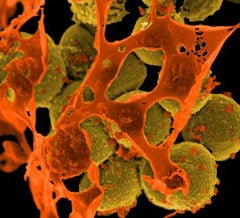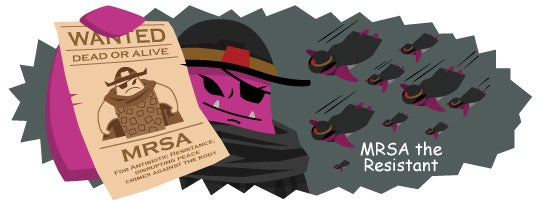MRSA, a very nasty group of bacteria
 You learned earlier that many kinds of bacteria live on the surface of our skin. One common type is Staphylococcus aureus. Normally, these bacteria will work to keep other bacteria under control. They help to prevent skin rashes, sores, and infections.
You learned earlier that many kinds of bacteria live on the surface of our skin. One common type is Staphylococcus aureus. Normally, these bacteria will work to keep other bacteria under control. They help to prevent skin rashes, sores, and infections.
Everything is fine as long as the staphylococcus bacteria stay on the outside of our bodies. Trouble starts when they enter the body through a puncture wound, cut, or deep scrape. Even worse, many of the staphylococcus bacteria are now resistant to certain kinds of antibiotics. They are known as MRSA, short for Methicillin-resistant Staphylococcus aureus.
 MRSA causes very serious, even, deadly infections. Most are skin infections. A person’s life could be in danger when MRSA gets into the bloodstream. MRSA can even infect a site where doctors have cut during surgery.
MRSA causes very serious, even, deadly infections. Most are skin infections. A person’s life could be in danger when MRSA gets into the bloodstream. MRSA can even infect a site where doctors have cut during surgery.
Scientists have learned a lot about MRSA. As many as two out of every 100 people carry the MRSA bacteria on their bodies. Lots of people have staph bacteria in their noses. Most never get sick.
Protect yourself!
You can protect yourself from MRSA infections with good personal hygiene. Follow these tips to help stop germs from invading your body.
 Wash your hands often. Keep your body clean, especially after exercise. Wash your hands often. Keep your body clean, especially after exercise. |  Keep cuts, scrapes, and wounds clean and covered until healed. Keep cuts, scrapes, and wounds clean and covered until healed. |
 Don’t share personal items such as towels or wash rags. Don’t share personal items such as towels or wash rags. |  Don’t wait. See a doctor if you think you might have an infection. Don’t wait. See a doctor if you think you might have an infection. |
Additional images from Wikimedia via ArturoJuárezFlores (MRSA scan), and Bill Branson (hands being washed).
Read more about: Microbes
Bibliographic details:
- Article: MRSA
- Author(s): Dr. Biology
- Publisher: Arizona State University School of Life Sciences Ask A Biologist
- Site name: ASU - Ask A Biologist
- Date published:
- Date accessed:
- Link: https://askabiologist.asu.edu/mrsa
APA Style
Dr. Biology. (). MRSA. ASU - Ask A Biologist. Retrieved from https://askabiologist.asu.edu/mrsa
Chicago Manual of Style
Dr. Biology. "MRSA". ASU - Ask A Biologist. . https://askabiologist.asu.edu/mrsa
Dr. Biology. "MRSA". ASU - Ask A Biologist. . ASU - Ask A Biologist, Web. https://askabiologist.asu.edu/mrsa
MLA 2017 Style

Be Part of
Ask A Biologist
By volunteering, or simply sending us feedback on the site. Scientists, teachers, writers, illustrators, and translators are all important to the program. If you are interested in helping with the website we have a Volunteers page to get the process started.

